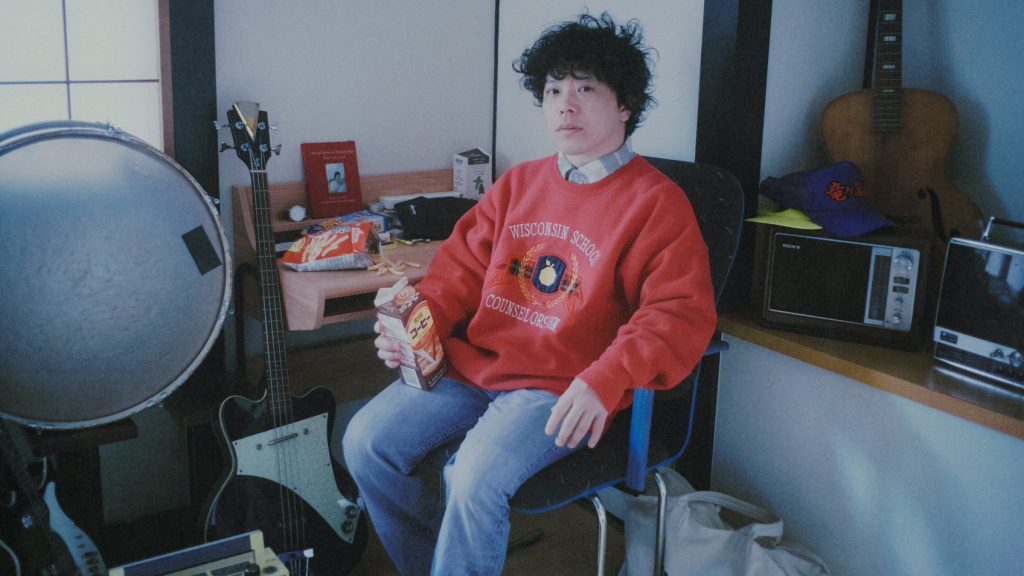In 1983, the inhabitants of Shizuoka, Japan, were blessed with drummer and composer par excellence Jumpei Kamiya. The country is distinguished for its traditional yet innovative approach to most things—think digital calligraphy, or more famously, sentient toilets—and Kamiya has incorporated this into innumerable hours of jazz performance study, honing his sound through experimentation.
In March of this year, the world was invited to listen to Numbnuts, a lovably wholesome little album he released working calmly in conjunction with the hopeful bloom of the spring months. Expect easy-going ballads that prepare the palate like an amuse-bouche, paired with rhythmic complexity, and finished with a voice so cherubic it can conjure harps at will. That’s not to say the music isn’t accessible however, because while he might be a percussionist at heart, Kamiya dons various musical skins; as composer, multi-instrumentalist, and all-around polymath.
Curiously exploring the intricacies of soothing playfulness, this collection of songs is like a sonnet dedicated to purity. For example, the folksy, embracing quality of “Forgive, Forget” is a loving ode to letting go and releasing the shadows eating at human souls. “How could I forgive you, I believe we’ve never even met,” vocalist Daniel Kwon sings delicately, channeling the quiet airiness of singers like Nick Drake and Donovan. It conjures images of flutes, acoustic guitars, and dandelions in people’s midsummer hair, perfect for a grassland jam, with the sun peeking through the leaves of a giant redwood.
Before you brush Numbnuts off as a work of peace-pipe puffing hippieness though, keep in mind the lyrics of the next song, “Blowfish,” go like, “Blood and guts and a flying chair.” The contrast adds a sinister degree to the tenderness, like the mild brutality of a feline scratch. Kwon’s vocal melodies are inventive, keeping things fresh and unpredictable, and the same can be said about Kamiya’s instrumentation—he’s played everything on this project, from organ to clarinet. The intonation on the singing lilts up and down in an incalculable graph, while somehow still complementing Kamiya’s intricate playing. In fact, “Blowfish” uses a behind-the-beat format extending beyond the drums, and onto the guitar, adding a complex layer to the music, combined with a locked-in bassline and overarching soundscapes that are almost blink-and-miss.
Just when you think you’ve got their number, Numbnuts pauses to offer a perky burst of energy with the choo choo chug-a-long of “Going Down,” a song that’s over as soon as it begins, promising more at the intro than it delivers moments later. Fret not though, because the sinewy stabs of “Topsy Turvy” does its best to change the frequency. Channeling the early electro-revolución of LCD Soundsystem and an indo subtlety all its own, this song begins with hits of a wonky synth, as Kwon sings “Milky kisses, I love you.” Accompanied by an industrial groove equal parts simple and heavy, there’s a distinct 80s tinge to this tune. Perhaps it’s the arpeggiated synth bass (almost like Queen’s iconic “I Want to Break Free”).
The music then takes a charming detour into candy-coated cuddliness with “Ladies Night,” a song Owl City would be proud of, thanks to its high-pitched vocal work and the fact it starts with what could very well be a melodica. Luckily for one and all, the sweetness is not overbearingly saccharine, tempered by—of all things—a somber saxophone. Things veer towards lunacy by the Phishy second half, with Kwon squealing “Shake and bake.” If ever there was a moment for totally understandable befuddlement, it would be here. Also, pay attention to the vacuum-sealed tightness of the bass tone and playing at this part—it’s something most professional ‘wrappers’ would be jealous of.
Things then wind down with “XYZ,” a song heavily highlighting the impact of slowness, piling on the brakes, dialing the tempo down, and using a minimalistic approach. “Crowd work is tough, oh it’s a tough crowd,” Kwon croons (for real, ‘crooning’ is the best way to describe this particular song’s delivery—it’s like Weezer’s nonchalant singing, but stretched across a wider range), and suddenly you realize this guy’s quite smithy with words and such. A snare brush—rhythmic and textured—brings on the vibe of a smoky jazz bar on its last legs, with the town drunk passed out on the counter. Percussive, muted guitars syncopate over and above the piano. Scratch that, it might not be a guitar at all; it may be pizzicatos on a cello or harp. Either way, it would be great to get some insight into Kamiya’s compositional technique and process to know what all the sounds actually are.
As it comes to the time for a final hurrah, a gentle horn section plays hide and seek with the guitar on “Deadpan,” an inner playfulness that’s palm breeziness through and through, while unadorned instrumentation and understated vocals keep the mood light. Singing about “Pina Coladas” and “Coconut sand,” but offsetting the laidback energy with more heavy-set lyrics like “Blood from the trees” and “It’s walking distance to a dystopian land,” Kwon conclusively proclaims, “Welcome to Japan.” That hook is repeated for a while as the guitars, horns, and piano crescendo, make for a truly telling song about the dual nature of their home country. Lyrically, switching between cerulean serenity at one moment, and violent imagery the next could be a comment on the soulful beauty at the heart of the nation, alongside a past that has both suffered and committed its fair share of atrocities.
Bunny hopping from cutesy folk to electro-lightning, this album showcases Kamiya’s chops by balancing the gentle aloha of “Forgive, Forget,” with the indescribable umami of “Topsy Turvy.” Things get silly and whimsical one second before Kwon’s deceivingly innocent lyrics drag you into the depths in the next. It oscillates between light and dark, focusing on embracing earthly warmth while acknowledging worldly viciousness. Instead of using genre-bending as a gimmick, the style explores vulnerability and contradiction, achieving emotional and instrumental coherence that doesn’t just feel like a flex of musicianship. Numbnuts is a feather-meets-fury assortment of songs filled with tenderness and intimacy, sure to leave a lasting impression on anyone with a heart.





